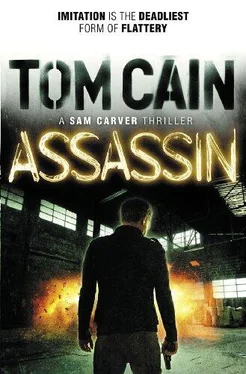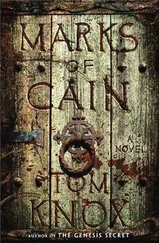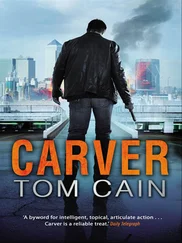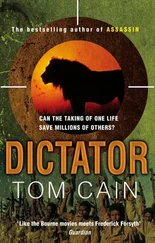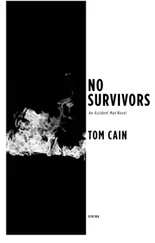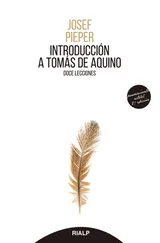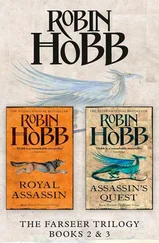Carver steered the RIB over the ship’s wake until it was alongside the buttresses, as close as he could get to the stern opening. He tied one end of the rope to the steering wheel and turned the wheel so that the boat was virtually on the same course as the ferry, but turning slightly in towards the hull. Then he tied the other end of the rope to the chromed steel windscreen-frame, locking the steering wheel in place.
The RIB was nuzzling up against the ferry, but it would only stay in position for a matter of seconds, so Carver had to move fast. He grabbed the anchor chain and then clambered up on to the seats till he was standing astride the boat, one foot on each seat, leaning backwards so that his calves were resting against the seat-backs, taking the strain as the RIB bucked and lurched against the seething waters at the stern of the ferry.
He gripped the chain so his right hand was just below the anchor and a short length of chain hung between that and his left hand. Then, slowly at first, but with increasing momentum, he began to rotate his right arm, gradually paying out the chain, raising it above his head until it was swinging through the air like a lasso above the boat. Carver felt the cut in his back open up again under the strain of the movement, but ignored it. He gave a final, mighty heave and hurled the anchor at the opening.
Oslo is sheltered by a belt of islands, stretching the full width of Oslo fjord, just south of the city. Tyzack’s pilot headed straight for the shelter of the nearest island, flying low and getting into its lee, so that the helicopter could not be seen from the mainland. He flew slowly, creeping between the outcrops of land until he reached the fjord’s main shipping channel. That was when he saw the massive hull of the Queen of Jutland, to the right of his aircraft, steaming towards him from the north.
The light was fading now and it had started to rain, making the visibility still worse. So it took the pilot a couple of seconds to spot the RIB coming up behind the ferry’s stern, and a few more to realize that whoever was driving the boat wasn’t going to miss the Queen of Jutland. In fact, he was… well, for a moment it looked like he might be trying to board it.
‘Take a look down there, boss,’ he said to Tyzack, pointing towards the ocean. ‘There’s some bloke on an RIB playing silly buggers. Total bloody lunatic.’
Tyzack rolled his eyes and then, like a parent indulging an attention-seeking child, did as the pilot asked.
He looked down towards the ferry.
And that was when he burst out laughing.
The anchor clanged against the ferry’s hull just below the opening, fell down, slid along the buttress and splashed into the water.
As he pulled it out, Carver realized that he’d miscalculated his speed. It was set fractionally slower than the ferry. The RIB was steadily losing ground, sliding back along the buttress. Very soon he would have lost contact with the ferry completely. He could reset his speed and course, but that would mean untying and retying the rope around the steering wheel, and the longer he hung around the back of the ferry the more certain it was that he would be spotted.
No, he’d keep the boat set exactly as it was. Have another go and pray he could get aboard in time.
Once again he arced the anchor chain through the air, giving it even more speed this time and an even greater effort on the final throw. It flew into the air, hit the top of the opening and disappeared into the ferry like a football going in off the crossbar.
The RIB was still sliding backwards. First the outboard motor was into open water. Then the boat began to come free of the ferry, inch by inch. Very soon it would unbalance, swing round and be swirled helplessly in the ferry’s wake.
Carver tugged at the chain and felt a reassuring resistance as the anchor caught against the inside of the hull. He felt the seats beneath him buck up and down and swerve from side to side as the RIB became progressively less stable.
There was no time left.
He gave one last heave on the chain and leaped out across the RIB towards the ferry. He smashed against the hull with an impact that knocked the breath from his body. For a moment he loosened his grip on the chain and slipped down until he was almost to his waist in the sea, the saltwater stinging as it splashed up against his open wound, every swell of the wake drawing him away from the hull and then crashing him into it again.
Christ, the water was cold! No wonder that kid had looked so furious when he was thrown into the sea by the opera house. Carver was chilled to the bone within seconds.
Behind him Carver saw the RIB swirl off into the darkness like a twig in a racing stream. He had nowhere else to go now. He had to get to the top of the chain or he would be washed away to his death.
He lifted one hand above the other, then tensed himself for the next crash against the hull.
As the water moved him away from the hull again, he moved his other hand a little further up the chain. And so it went on: the agonizingly slow movements up the slippery chain; the repeated slips as his wet, cold-numbed fingers lost their grip; the terrible shivering as the chill of the water seeped ever deeper into his body; and all the time the constant battering of flesh and bone against plate steel. Finally, though, Carver hauled himself almost clear of the water and now he could lean back on the chain and place his feet against the side of the buttress and haul himself up, pace by pace, hand over hand, until he was standing at the foot of the final sheer stretch up the hull to the opening.
He gritted his teeth to stop their incessant chattering, wiped the seawater and rain from his eyes and reminded himself that when he was in the SBS he’d think nothing of training exercises that required him to climb up the legs of a giant North Sea oil rig, or the hull of the Queen Elizabeth II. All he had to do now was get up a lousy bit of steel.
And then he heard a new sound, the clattering of a helicopter rotor. Still holding the chain, he twisted round so that he was looking away from the ferry, out to sea, and instantly saw the chopper, outlined against the last fragments of light on the western horizon. It was hovering, inquisitively, some way off, watching and waiting with all the cruel patience of a cat at a mousehole. Carver leaned back, placed his feet against the hull and started pulling himself up towards the opening, taking the strain on his shoulders, arms and thighs.
Now the predator swooped. The helicopter moved much closer to the boat. A searchlight cut through the darkness and rain, picking him out against the dazzling white backdrop of the hull and forcing him to screw his eyes shut to keep out its scorching glare. Directly above him, barely an arm’s length away, he heard a sharp, percussive rattle, like stones catapulted against a sheet of corrugated iron. Someone was shooting at him. Carver flinched, dreading the impact of a ricochet. The gunman in the helicopter fired again, even closer this time. There was no noise or muzzle-flash from the weapon, just the same rattling stones. It didn’t take a genius to work out the choice that Carver was being given. By the time the third salvo was fired, he had let go of the chain and was falling towards the water. This time the bullets hit the hull exactly where his body had been.
The ferry steamed away; the helicopter hovered directly over Carver and a rope was lowered down to him. He trod water, held a hand over his eyes to deflect the buffeting down-draught and saw Tyzack standing in the doorway smirking down at him. Carver was being mocked and, as the rope dangled in the water in front of him, he suddenly understood why. He’d got the whole thing wrong and everything he had done – not just tonight but for days, even weeks – had been based on lousy, idiotic, unforgivable stupidity. He was so angry with himself, so frustrated, that he almost didn’t reach out for the rope. It was an admission of defeat. Problem was, he didn’t have a better idea. Besides, the closer he got to Tyzack, the easier it would be to wipe that stupid grin off his face.
Читать дальше
